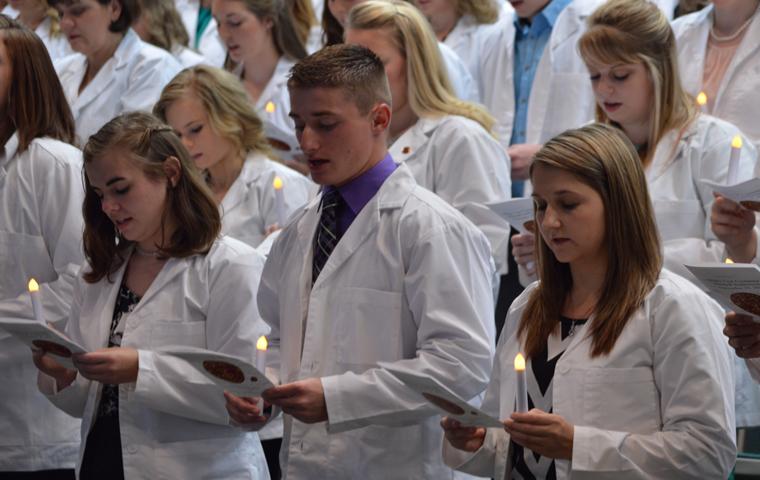
Dr. Constance Swenty, chair of bachelor of science in nursing program, said she looks forward to welcoming new nurses to the profession.
A total of 132 nursing students graduating in fall 2016 and spring 2017 received their pins and white coats at a white coat ceremony Friday, a first for the university.
Nursing students originally had capping ceremonies beginning in 1874 until the late twentieth century when standard nurses’ uniforms still included caps. After nurses stopped wearing caps in the 1980s nursing programs didn’t have a way to recognize their students until last year when a few schools began hosting White Coat Ceremonies for nurses.
“It has traditionally been a ceremony for physicians and pharmacists,” Swenty said. “This year the Arnold Gold Foundation and AACN, which is a nursing organization, chose 60 nursing programs across the county to fund a white coat ceremony and we were chosen.”
White coat ceremonies traditionally occur just before nursing students begin their clinical courses in real hospitals.
“We present them with a white coat,” Swenty said. “Primarily to remind them that their role as a nurse is to care for patients, to be compassionate, and that’s why we’re there.”
Several nurses spoke at the event sharing stories about each of their roughly 40 years of experience.
“Our clinical facilities were all represented here tonight,” Swenty said. “The speakers were from our clinical facilities and they also are supporting our students.”
Eric Tatum, a junior nursing student, looks forward to joining the nursing profession.
“I just enjoyed hearing from the chief nursing officers, all three from perspective hospitals of this region,” Tatum said. “It was nice hearing kind of their journey through nursing, where it’s taken them, and hearing a little bit about their professional background.”
Nursing students still have plenty of school work ahead of them, especially students in the accelerated program who start one semester later and graduate one semester earlier than other nursing students.
“Since we’re in the accelerated program we have clinicals each semester from here on out,” Tatum said.
“We [students in the accelerated program] just started in August and some of our classes are combined or are shortened from a normal semester to a half of a semester,” said Michelle Schnapf, a nursing student.
Schnapf said the ceremony made her even more proud of becoming a nurse.
“I was more excited for the fact that we get recognized as a nurse, to know that we are supported in the career we are about to be going into,” Schnapf said. “It’s a way of letting my family get to see how much the nurses really do care about us succeeding.”


